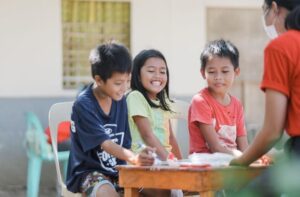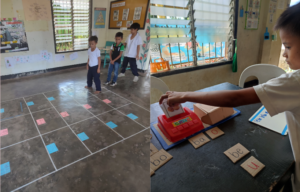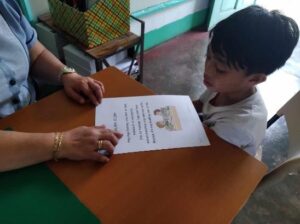Project SUPER/Project SIDLAK GABAY
27 أبريل 2024

Nearly 16 months since emerging from COVID-19 lockdown, impact on student learning continue to linger at the Alejandro Acuña Yap Quiña Memorial Elementary School (AAYQMES), one of the many public schools in the Philippines, situated in the Visayas region of Negros Occidental.
With more than half of the student population lacking access to the internet or the required devices for online or blended learning, AAYQMES chose to implement a fully modular distance learning approach during the lockdown. Despite efforts from teachers and parents who also had to adjust to the new mode of learning and instruction while balancing work and home responsibilities, this initiative inevitably resulted in learning gaps due to a limited or lack of knowledge and skills reinforcement at home. By the time public schools opened again in September 2022, 18% of students were identified as frustrated readers, and 82% as non-readers. Based on official school data, approximately 15% of the total school population of 885 students needed to catch up on their reading development in that school. As a response to this challenge, the school implemented various reading remediation programs to mitigate these issues and address immediate student needs.
One of the early reading programs introduced was Project Super, a weekly reading remediation program initiative implemented by the school division of Victorias City under the Department of Education. The programme aimed to develop the reading comprehension skills of students by using a series of leveled books titled “Developing Reading Power” (DPR). As a tool for teachers, each book consisted of selected stories focusing on a specific reading comprehension skill such as noting details, predicting outcomes, making inferences etc. An assessment tool was also offered at the back of the book for teachers to record the progression of the child’s skills by tracking their reading speed and comprehension. However, the teachers observed that the reading programme did not address the needs of all students, especially the non-readers and frustrated readers who continued to struggle with the early stages of reading. Therefore, two new reading programmes were implemented in AAYQMES to address this gap – namely the Functional Literacy Programme (FLP) for SY 22-23 and the Adopt a Child Programme: Literacy Light Up Initiative (AACP) for the current school year (23-24).

Teacher fellows from Teach for the Philippines (TFP), a non-government organisation provided the learning services to public school communities, implemented programs that targeted basic reading remediation and life skills support. The FLP went beyond being just a remediation programme, It was also an intervention initiative designed to provide foundational reading skills in the Filipino language for students with evident and pressing needs. A Baseline Assessment was used to select the students for the programme, with a total of 45 students selected. Classes were conducted in small groups with a 5-7:1 student-to-teacher ratio. The small class size ensured that students were closely supported by the teacher. Home-school partnerships were also strengthened through the Gabay sa Bahay Programme (teacher-parent support) under FLP which recognises the importance of home support for the student’s academic success and socio-emotional development.
The implementation of the Adopt a Child Programme (ACCP) started on the second week of November 2023 in support of the city government’s campaign to have zero non-readers by the end of the school year. Much like FLP, AACP aims to elevate the reading skills of identified struggling readers for the new school year. A total of 20 non-readers and 111 frustrated readers, across Grades 1-6 were selected for the programme. The ACCP is a collective action from the school community which involved the school head, classroom teachers, and TFP Teacher Fellows.

To enhance the efforts of the school, Project SIDLAK Gabay was launched as a community project. This endeavour aims to address literacy challenges while also underscoring the importance of socio-emotional and mental health in the students’ development, thereby acknowledging the direct correlation of behavior problems to academic struggles and vice versa. The project will mobilise school resources by empowering guardians and student volunteers in socio-emotional learning and basic teaching skills. The project will eventually expand its reach and impact by localising support: guardians to guardians, students to students.
To help students develop a love for reading, Project SIDLAK also aims to upscale the school library with more varied reading and learning resources, making it more functional and inviting to the students. As a school community-led initiative, one of the main challenges of the project is funding. To provide learning resources for volunteer training, community outreach, and library materials like books and other educational tools, Project SIDLAK Gabay is actively raising funds and seeking partners and donors to achieve the project goals successfully. For possible partnership opportunities and queries on the projects, do reach out to SIDLAK Gabay at sidlakgabay@gmail.com.
Contributed by Jim Miguel Edmilao. Teacher Fellow, Teach for the Philippines and Michelle Angela B.Giron, Project Head, SIDLAK Gabay